|
Books Should Be Free Loyal Books Free Public Domain Audiobooks & eBook Downloads |
|
|
Books Should Be Free Loyal Books Free Public Domain Audiobooks & eBook Downloads |
|
History Books |
|---|
|
Book type:
Sort by:
View by:
|
By: Anonymous | |
|---|---|
 Golden Deeds Stories from History
Golden Deeds Stories from History
| |
 The Oaths, Signs, Ceremonies and Objects of the Ku-Klux-Klan. A Full Expose. By A Late Member
The Oaths, Signs, Ceremonies and Objects of the Ku-Klux-Klan. A Full Expose. By A Late Member
| |
 Letters of a Soldier 1914-1915
Letters of a Soldier 1914-1915
| |
 A Letter From a Clergyman to his Friend, with an Account of the Travels of Captain Lemuel Gulliver
A Letter From a Clergyman to his Friend, with an Account of the Travels of Captain Lemuel Gulliver
| |
 The American Goliah
The American Goliah
| |
 The Moravians in Labrador
The Moravians in Labrador
| |
 The Ancient Banner Or, Brief Sketches of Persons and Scenes in the Early History of Friends
The Ancient Banner Or, Brief Sketches of Persons and Scenes in the Early History of Friends
| |
 Is Ulster Right?
Is Ulster Right?
| |
 The Ghost of Chatham; A Vision Dedicated to the House of Peers
The Ghost of Chatham; A Vision Dedicated to the House of Peers
| |
 A Dialogue Between Dean Swift and Tho. Prior, Esq. In the Isles of St. Patrick's Church, Dublin, On that Memorable Day, October 9th, 1753
A Dialogue Between Dean Swift and Tho. Prior, Esq. In the Isles of St. Patrick's Church, Dublin, On that Memorable Day, October 9th, 1753
| |
 Santa Claus, Kriss Kringle or St. NIcholas
Santa Claus, Kriss Kringle or St. NIcholas
volunteers bring you 14 recordings of Santa Claus, Kriss Kringle or St. NIcholas by Anomymous. This was the Fortnightly Poetry project for December 16, 2018. ------ This poem was published in booklet form with illustrations in 1897. - Summary by David Lawrence | |
 St. Clair's Defeat 1791
St. Clair's Defeat 1791
St. Clair's defeat was a battle fought between the United States and the Western Confederacy of Native Americans on November 4, 1791, during the Northwest Indian War. Out of a US force of roughly 1000 men and officers, only 24 escaped unharmed. It has been cited as the most decisive defeat in the history of the American military and its largest defeat ever by Native Americans. This pamphlet is a compilation of three articles published in 1847, 1851 and 1864. | |
 Shri Dnyaneshwar - A Sketch Of His Life And Teachings
Shri Dnyaneshwar - A Sketch Of His Life And Teachings
An overview of the life of Shri Dnyaneshwar and his devoted family. Dnyaneshwar was a 13th-century Indian poet and yogin. He commentated the Bhagavad Gita in a timeless manner while in his teens, and wrote an original book of verse. He was an inspirational speaker with many followers. - Summary by Czandra | |
 Doctrina Christiana
Doctrina Christiana
DOCTRINA CHRISTIANAThe first book printed in the Philippines has been the object of a hunt which has extended from Manila to Berlin, and from Italy to Chile, for four hundred and fifty years. The patient research of scholars, the scraps of evidence found in books and archives, the amazingly accurate hypotheses of bibliographers who have sifted the material so painstakingly gathered together, combine to make its history a bookish detective story par excellence. It is easy when a prisoner has been... | |
By: Anonymous, attributed to Kathleen Luard (c.1872) | |
|---|---|
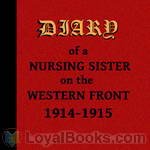 Diary of a Nursing Sister on the Western Front 1914-1915
Diary of a Nursing Sister on the Western Front 1914-1915
The title is, I think, self explanatory. The nurse in question went out to France at the beginning of the war and remained there until May 1915 after the second battle of Ypres when she went back to a Base Hospital and the diary ceases. Although written in diary form, it is clearly taken from letters home and gives a vivid if sometimes distressing picture of the state of the casualties occasioned during that period. After a time at the General Hospital in Le Havre she became one of the three or four sisters working on the ambulance trains which fetched the wounded from the Clearing Hospitals close to the front line and took them back to the General Hospitals in Boulogne, Rouen and Le Havre. | |
By: Anthony Hamilton (1646-1720) | |
|---|---|
 Quotes and Images From Memoirs of Count Grammont
Quotes and Images From Memoirs of Count Grammont
| |
 The Memoirs of Count Grammont
The Memoirs of Count Grammont
| |
By: Anthony Hope (1863-1933) | |
|---|---|
 Simon Dale
Simon Dale
| |
By: Anthony Norris Groves (1795-1853) | |
|---|---|
 Journal of a Residence at Bagdad During the Years 1830 and 1831
Journal of a Residence at Bagdad During the Years 1830 and 1831
| |
By: Anthony Trollope (1815-1882) | |
|---|---|
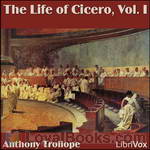 The Life of Cicero
The Life of Cicero
Marcus Tullius Cicero (106-43BC) was an orator, statesman, philosopher and prolific correspondent, who rose as a ‘new man’ in Rome in the turbulent last years of its republican government. Anthony Trollope, best known as a novelist, admired Cicero greatly and wrote this biography late in life in order to argue his virtues against authors who had granted him literary greatness but questioned his strength as a politician and as a man. He takes a personal approach, affording us an insight into his own mind and times as well as those of his subject... | |
 North America — Volume 1
North America — Volume 1
| |
 La Vendée
La Vendée
| |
 Clergymen Of The Church Of England
Clergymen Of The Church Of England
This 1866 book was published in a time of great change in the Church of England. Trollope began as a High Church adherent and then worked his way to a Broad Church stance, a theological liberalism . This book deals with a crisis of faith and a crisis of structural form in the Victorian Church of England. It possesses all the interesting attributes of the novelist’s style. Note on the final chapter: John William Colenso was a British mathematician, theologian, Biblical scholar and social activist, who was the first Church of England Bishop of Natal. His progressive views on biblical criticism and treatment of African natives were controversial. - Summary by David Wales | |
By: Anthony Weldon (1583-1648) | |
|---|---|
 Court and Character of King James whereunto Is Now Added the Court of King Charles: Continued unto the Beginning of These Unhappy Times: with Some Observations upon Him Instead of a Character
Court and Character of King James whereunto Is Now Added the Court of King Charles: Continued unto the Beginning of These Unhappy Times: with Some Observations upon Him Instead of a Character
Gossipy exposés of shenanigans at the heart of government are nothing new. The author, Sir Anthony Weldon , was a courtier of years of experience and standing; his account of court intrigues around the Stuart Kings James I and Charles I was written seemingly in the tense period leading up to the English Civil War in the 1640s, and for a private readership . This text, known as the source for the summing up of James I as "the wisest fool in Christendom", gives us an insider's partisan, at times... | |
By: Antonio de Morga (1559-1636) | |
|---|---|
 History of the Philippine Islands
History of the Philippine Islands
| |
By: Antony Bluett | |
|---|---|
 With Our Army in Palestine
With Our Army in Palestine
| |
By: Archduke of Austria Ludwig Salvator (1847-1915) | |
|---|---|
 The Caravan Route between Egypt and Syria
The Caravan Route between Egypt and Syria
| |
By: Archer Butler Hulbert (1873-1933) | |
|---|---|
 The Paths of Inland Commerce; a chronicle of trail, road, and waterway
The Paths of Inland Commerce; a chronicle of trail, road, and waterway
| |
By: Archibald Forbes (1838-1900) | |
|---|---|
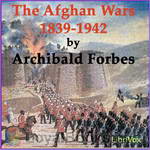 The Afghan Wars 1839-42 and 1878-80, Part 1
The Afghan Wars 1839-42 and 1878-80, Part 1
The First Anglo–Afghan War was fought between British India and Afghanistan from 1839 to 1842. It was one of the first major conflicts during the Great Game, the 19th century competition for power and influence in Central Asia between the United Kingdom and Russia, and also marked one of the worst setbacks inflicted on British power in the region after the consolidation of British Raj by the East India Company. | |
By: Archibald Gracie (1858-1912) | |
|---|---|
 Truth about the Titanic
Truth about the Titanic
Colonel Archibald Gracie was the first survivor of the sinking of the Titanic to die, and this first-hand account was published posthumously. He attempts to dispel some of the rumors surrounding the tragic event and gives his personal observations and an account of his survival clinging to the hull of an overturned collapsible lifeboat after helping many others to escape safely. A large portion of the book is given to personal accounts of other survivors from both the American and British boards of inquiry, boat by boat. - Summary by Larry Wilson | |
By: Archibald Grimké (1849-1930) | |
|---|---|
 William Lloyd Garrison, the Abolitionist
William Lloyd Garrison, the Abolitionist
"THE author of this volume desires . . . to say . . . that it is his earnest hope that this record of a hero may be an aid to brave and true living in the Republic, so that the problems knocking at its door for solution may find the heads, the hands, and the hearts equal to the performance of the duties imposed by them upon the men and women of this generation. William Lloyd Garrison was brave and true. Bravery and truth were the secret of his marvelous career and achievements. May his countrymen and countrywomen imitate his example and be brave and true, not alone in emergent moments, but in everyday things as well." | |
By: Archibald H. Sayce (1845-1933) | |
|---|---|
 Babylonians and Assyrians, Life and Customs
Babylonians and Assyrians, Life and Customs
| |
By: Archibald Henderson (1877-1963) | |
|---|---|
 The Conquest of the Old Southwest; the romantic story of the early pioneers into Virginia, the Carolinas, Tennessee, and Kentucky, 1740-1790
The Conquest of the Old Southwest; the romantic story of the early pioneers into Virginia, the Carolinas, Tennessee, and Kentucky, 1740-1790
| |
By: Archibald Henry Grimké (1849-1930) | |
|---|---|
 William Lloyd Garrison The Abolitionist
William Lloyd Garrison The Abolitionist
| |
By: Archibald MacMechan (1862-1933) | |
|---|---|
 Chronicles of Canada Volume 27 - The Winning of Popular Government: A Chronicle of the Union of 1841
Chronicles of Canada Volume 27 - The Winning of Popular Government: A Chronicle of the Union of 1841
In the 1830's, Canada was a ideologically divided country. Political upheaval and even riots occurred over Canada's future. Would it remain a subsidiary of England? Would it form its own republic, or even merge with the United States? This work tells of how some of Canada's founding fathers crossed the bridge between past and future. | |
By: Archibald Murray Howe (1848-) | |
|---|---|
 Colonel John Brown, of Pittsfield, Massachusetts, the Brave Accuser of Benedict Arnold
Colonel John Brown, of Pittsfield, Massachusetts, the Brave Accuser of Benedict Arnold
| |
By: Aristophanes (446BC - 385BC) | |
|---|---|
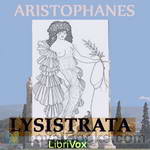 Lysistrata
Lysistrata
Lysistrata read by the Classics Drama Company at DePaul. The Classics Drama Company at DePaul is a new gathering of Thespians and Classicists dedicated to performing and understanding ancient literature. If you live in Chicago and attend DePaul University, we welcome new additions to our group. Contact Dr. Kirk Shellko (kshellko@depaul.edu), if interested.First performed in classical Athens c. 411 B.C.E., Aristophanes’ Lysistrata is the original battle of the sexes. One woman, Lysistrata, brings together the women of all Greece, exhorting them to withhold sexual contact from all men in order that they negotiate a treaty... | |
By: Arnold Wynne (1880-) | |
|---|---|
 The Growth of English Drama
The Growth of English Drama
| |
By: Arthur Bartlett Maurice (1873-1946) | |
|---|---|
 Fifth Avenue
Fifth Avenue
| |
By: Arthur D. (Arthur Donald) Innes (-1938) | |
|---|---|
 England under the Tudors
England under the Tudors
| |
By: Arthur D. Hall | |
|---|---|
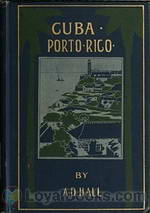 Cuba Its Past, Present, and Future
Cuba Its Past, Present, and Future
| |
By: Arthur Edward Mainwaring (1864-) | |
|---|---|
 The Second Battalion Royal Dublin Fusiliers in the South African War With a Description of the Operations in the Aden Hinterland
The Second Battalion Royal Dublin Fusiliers in the South African War With a Description of the Operations in the Aden Hinterland
| |
By: Arthur F. (Arthur Foley) Winnington Ingram (1858-1946) | |
|---|---|
 The After-glow of a Great Reign Four Addresses Delivered in St. Paul's Cathedral
The After-glow of a Great Reign Four Addresses Delivered in St. Paul's Cathedral
| |
By: Arthur F. J. Remy (1871-1954) | |
|---|---|
 The Influence of India and Persia on the Poetry of Germany
The Influence of India and Persia on the Poetry of Germany
| |
By: Arthur Gleason (1878-1923) | |
|---|---|
 Young Hilda at the Wars
Young Hilda at the Wars
| |
By: Arthur Graeme West (1891-1917) | |
|---|---|
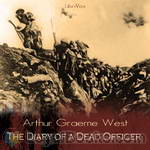 The Diary of a Dead Officer
The Diary of a Dead Officer
Published posthumously in 1919, this collection of diary entries presents a scathing picture of army life and is said to be one of the most vivid accounts of daily life in the trenches. It chronicles West's increasing disillusion with war and his move toward pacifist and atheist beliefs. The final part consists of his powerful war poems, including God, How I Hate You, You Young Cheerful Men, and Night Patrol. West was killed by a sniper in 1917. In view of some of his poems, one wonders if death was not unwelcome. (Introduction adapted from Wikipedia by Ruth Golding) | |
By: Arthur Hassall (1853-1930) | |
|---|---|
 Making of the British Empire (A.D. 1714-1832)
Making of the British Empire (A.D. 1714-1832)
At its height, the British Empire was the largest in history. This short volume traces its development through the long 18th century, from 1714 to the end of the Napoleonic Wars. Founded on the prosperity of Sir Robert Walpole's ministry , the Empire emerged from the Indian conquests of that gifted military amateur, Lord Clive, and was extended under the leadership of William Pitt, Earl of Chatham, who drove the English to victory in the Seven Years' War . Surmounting the loss of the American colonies and twenty years of conflict with France, by the first quarter of the 19th century, the British navy, master of the oceans, presided over an Empire upon which the sun never set. | |
By: Arthur Henry Howard Heming (1870-1940) | |
|---|---|
 The Drama of the Forests Romance and Adventure
The Drama of the Forests Romance and Adventure
| |
By: Arthur Henry Johnson (1845-1927) | |
|---|---|
 Normans in Europe
Normans in Europe
This short history of the Normans in Europe opens with the invasions of the Vikings, who came from Scandinavian villages among rugged rocks and deep fiords. Johnson recounts how their myths of strife and woe, of the frost giants and of the crafty Loki, expressed their twin ideals of resourcefulness and war. These restless bands ravaged England, Germany, and France, penetrating the continents in their shallow-draft, half-decked ships. He writes that wherever they went they showed "themselves great warriors, founders, organizers, and administrators... | |
By: Arthur James Lyon Fremantle (1835-1901) | |
|---|---|
 Three Months in the Southern States, April-June 1863
Three Months in the Southern States, April-June 1863
| |
By: Arthur Judson Brown (1856-1963) | |
|---|---|
 New Forces in Old China An Inevitable Awakening
New Forces in Old China An Inevitable Awakening
| |
By: Arthur L. (Arthur Leslie) Salmon (1865-) | |
|---|---|
 The Cornwall Coast
The Cornwall Coast
| |
By: Arthur Léon Imbert de Saint-Amand (1834-1900) | |
|---|---|
 The Duchess of Berry and the Court of Charles X
The Duchess of Berry and the Court of Charles X
| |
By: Arthur Louis Keyser (1856-1924) | |
|---|---|
 From Jungle to Java The Trivial Impressions of a Short Excursion to Netherlands India
From Jungle to Java The Trivial Impressions of a Short Excursion to Netherlands India
| |
By: Arthur M. Mann | |
|---|---|
 The Boer in Peace and War
The Boer in Peace and War
| |
By: Arthur Poyser | |
|---|---|
 Tower Of London
Tower Of London
Description. History. “… those who read this book and have no opportunity of visiting the Tower expect that the characters in the moving drama of its history shall have some semblance of life as they walk across the stage…. My wish has been to persuade those who come to visit the Tower that there is a great deal to be seen in its immediate vicinity… A noble and historic building like the Tower resembles a venerable tree whose roots have spread into the soil in all directions, during the uncounted years of its existence, far beyond the position of its stem.” - Summary by Book Preface and David Wales | |
By: Arthur Ransome (1884-1967) | |
|---|---|
 The Crisis in Russia
The Crisis in Russia
| |
 Russia in 1919
Russia in 1919
PUBLISHER'S NOTE: On August 27, 1914, in London, I made this note in a memorandum book: "Met Arthur Ransome at_____'s; discussed a book on the Russian's relation to the war in the light of psychological background--folklore." The book was not written but the idea that instinctively came to him pervades his every utterance on things Russian. The versatile man who commands more than respect as the biographer of Poe and Wilde; as the (translator of and commentator on Remy de Gourmont; as a folklorist, has shown himself to be consecrated to the truth... | |
By: Arthur Ruhl (1876-1935) | |
|---|---|
 Antwerp to Gallipoli A Year of the War on Many Fronts—and Behind Them
Antwerp to Gallipoli A Year of the War on Many Fronts—and Behind Them
| |
By: Arthur Schopenhauer (1788-1860) | |
|---|---|
 Basis Of Morality
Basis Of Morality
In 1837, the Danish Royal Society of Sciences offered a prize to any essayist who could satisfactorily answer the question, "Is the fountain and basis of Morals to be sought for in an idea of morality which lies directly in the consciousness , and in the analysis of the other leading ethical conceptions which arise from it? Or is it to be found in some other source of knowledge?" The Basis of Morality is the essay submitted in 1840 by German philosopher Arthur Schopenhauer. In it, he first mercilessly... | |
By: Arthur Thomas Quiller-Couch (1863-1944) | |
|---|---|
 Adventures in Criticism
Adventures in Criticism
| |
 On The Art of Reading
On The Art of Reading
| |
 The Blue Pavilions
The Blue Pavilions
| |
 Fort Amity
Fort Amity
| |
 From a Cornish Window A New Edition
From a Cornish Window A New Edition
| |
By: Arthur William Knapp (1880-1939) | |
|---|---|
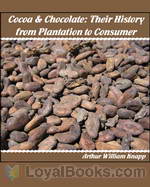 Cocoa and Chocolate: Their History from Plantation to Consumer
Cocoa and Chocolate: Their History from Plantation to Consumer
As that heavenly bit of chocolate melts in our mouths, we give little thought as to where it came from, the arduous work that went in to its creation, and the complex process of its maturation from a bean to the delicacy we all enjoy. This “little book” details everything you have ever wanted to know (and some things you never knew you wanted to know) about cocoa and chocolate from how the trees are planted and sustained to which countries produce the most cacao beans. Do cacao beans from various... | |
By: Arthur Young (1741-1820) | |
|---|---|
 A Tour in Ireland 1776-1779
A Tour in Ireland 1776-1779
| |
 Travels in France During the Years 1787, 1788, 1789
Travels in France During the Years 1787, 1788, 1789
Arthur Young, an English agriculturist, set out to write a travelogue on the state of agriculture in France and found himself in the midst of the French Revolution. His report on life in the capital and in the countryside in the years 1787, 1788, and 1789, replete with droll traveler's mishaps, becomes an eyewitness account of a society on the brink of catastrophe. From the court scene at Versailles to backroads villages comes this astonishing record of unfolding events, conspiracy theories about the queen, jubilation, and mass hysteria. | |
By: Ashbel Woodward (1804-1885) | |
|---|---|
 Wampum A Paper Presented to the Numismatic and Antiquarian Society of Philadelphia
Wampum A Paper Presented to the Numismatic and Antiquarian Society of Philadelphia
| |
By: Asser, Bishop of Sherborne | |
|---|---|
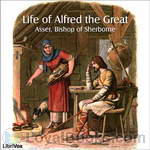 Life of Alfred the Great
Life of Alfred the Great
A life of King Alfred of England originally composed in Latin, possibly sometime around 888 A.D. by the Monk and Bishop Asser, although some scholars contend that the work was actually composed much later by an unknown hand. | |
By: Augusta J. Evans (1835-1909) | |
|---|---|
 At the Mercy of Tiberius
At the Mercy of Tiberius
| |
 Macaria
Macaria
| |
By: Auguste Comte (1798-1857) | |
|---|---|
 General View of Positivism
General View of Positivism
Auguste Comte was from France and published this book in French in 1844. He made a very great impact on the sciences and claims to have “discovered the principal laws of Sociology." Comte says Reason has become habituated to revolt but that doesn’t mean it will always retain its revolutionary character. He discusses Science, the trade-unions, Proletariat workers, Communists, Capitalists, Republicans, the role of woman in society, the elevation of Social Feeling over Self-love, and the Catholic Church in this book... | |
By: Augustine Birrell (1850-1933) | |
|---|---|
 Obiter Dicta
Obiter Dicta
| |
 Obiter Dicta Second Series
Obiter Dicta Second Series
| |
By: Augustine D. Crake (1836-1890) | |
|---|---|
 The Rival Heirs; being the Third and Last Chronicle of Aescendune
The Rival Heirs; being the Third and Last Chronicle of Aescendune
| |
 Alfgar the Dane or the Second Chronicle of Aescendune A Tale of the Days of Edmund Ironside
Alfgar the Dane or the Second Chronicle of Aescendune A Tale of the Days of Edmund Ironside
| |
By: Augustus Bridle (1869-) | |
|---|---|
 The Masques of Ottawa
The Masques of Ottawa
| |
By: Augustus J. Thebaud (1807-1885) | |
|---|---|
 Irish Race in the Past and the Present
Irish Race in the Past and the Present
| |
By: Augustus Jessopp (1823-1914) | |
|---|---|
 The Coming of the Friars
The Coming of the Friars
| |
By: Austin Bishop | |
|---|---|
 Tom of the Raiders
Tom of the Raiders
Young Adult historical fiction of a young man joining the Union Army and taking part in the Great Locomotive Chase. | |
By: Austin Craig | |
|---|---|
 Lineage, Life and Labors of Jose Rizal
Lineage, Life and Labors of Jose Rizal
LINEAGE LIFE AND LABORS of JOSE RIZAL PHILIPPINE PATRIOTBY AUSTIN CRAIGINTRODUCTION In writing a biography, the author, if he be discriminating, selects, with great care, the salient features of the life story of the one whom he deems worthy of being portrayed as a person possessed of preeminent qualities that make for a character and greatness. Indeed to write biography at all, one should have that nice sense of proportion that makes him instinctively seize upon only those points that do advance his theme... | |
By: Azel Ames (1845-1908) | |
|---|---|
 The Mayflower and Her Log; July 15, 1620-May 6, 1621
The Mayflower and Her Log; July 15, 1620-May 6, 1621
| |
By: B. F. (Benjamin Franklin) Cocker (1821-1883) | |
|---|---|
 Christianity and Greek Philosophy or, the relation between spontaneous and reflective thought in Greece and the positive teaching of Christ and His Apostles
Christianity and Greek Philosophy or, the relation between spontaneous and reflective thought in Greece and the positive teaching of Christ and His Apostles
| |
By: B. G. Jefferis and J. L. Nichols | |
|---|---|
 Searchlights on Health
Searchlights on Health
SEARCHLIGHTS ON HEALTH. THE SCIENCE OF EUGENICSBy PROF. B.G. JEFFERIS, M.D., PH. D. KNOWLEDGE IS SAFETY. 1. The old maxim, that Knowledge is power, is a true one, but there is still a greater truth: KNOWLEDGE IS SAFETY. Safety amid physical ills that beset mankind, and safety amid the moral pitfalls that surround so many young people, is the great crying demand of the age. 2. CRITICISM.--This work, though plain and to some extent startling, is chaste, practical and to the point, and will be a boon and a blessing to thousands who consult its pages... | |
By: B. Granville (Bernard Granville) Baker (1870-1957) | |
|---|---|
 From a Terrace in Prague
From a Terrace in Prague
| |
By: B. H. Roberts (1857-1933) | |
|---|---|
 Mormon Battalion, Its History and Achievements
Mormon Battalion, Its History and Achievements
A history of the Longest March of Military in History. The Mormon Battalion was the only religious unit in United States military history in federal service, recruited solely from one religious body and having a religious title as the unit designation. In 1847, as the Mormons were in Iowa heading West, after being driven out of their homes in Nauvoo, Illinois, the U.S. Army requested 500 volunteers to assist in the Mexican-American War effort. From July 1847 to July 1848 the battalion made a grueling march of nearly 2,100 miles from Council Bluffs, Iowa, to San Diego, California... | |
By: B. M. (Beale Melanchthon) Schmucker (1827-1888) | |
|---|---|
 The Organization of the Congregation in the Early Lutheran Churches in America
The Organization of the Congregation in the Early Lutheran Churches in America
| |
By: Bahá'í International Community | |
|---|---|
 Century of Light
Century of Light
| |
By: Barack Obama (1961-) | |
|---|---|
 Inaugural Presidential Address
Inaugural Presidential Address
| |
By: Baroness Emmuska Orczy (1865-1947) | |
|---|---|
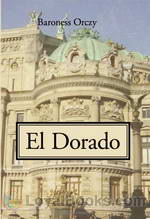 El Dorado
El Dorado
If you've read and loved the exciting classic The Scarlet Pimpernel then you'd probably be delighted to follow the further adventures of the dashing Sir Percy Blakeney. El Dorado by Baronness “Emmuska” Orczy depicts the intrepid swordsman and escape artist in the role of savior of the French royal family. Published in 1913, El Dorado was the fourth in the Pimpernel series of eleven books, numerous short stories and other related writings about her famous British adventurer. However, Orczy did not always follow a strict chronological sequence while publishing the novels and hence, there is plenty of overlap between the time frames of the stories... | |
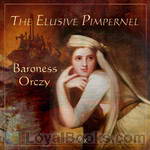 The Elusive Pimpernel
The Elusive Pimpernel
First Published in 1908, The Elusive Pimpernel by Baroness Orczy is the 4th book in the classic adventure series about the Scarlet Pimpernel. | |
By: Bartolomé de las Casas (1484-1566) | |
|---|---|
 Brief Account of the Destruction of the Indies
Brief Account of the Destruction of the Indies
A Short Account of the Destruction of the Indies (Spanish: Brevísima relación de la destrucción de las Indias) is an account written by the Spanish Dominican friar Bartolomé de las Casas in 1542 (published in 1552) about the mistreatment of the indigenous peoples of the Americas in colonial times and sent to then Prince Philip II of Spain. One of the stated purposes for writing the account is his fear of Spain coming under divine punishment and his concern for the souls of the Native Peoples... | |